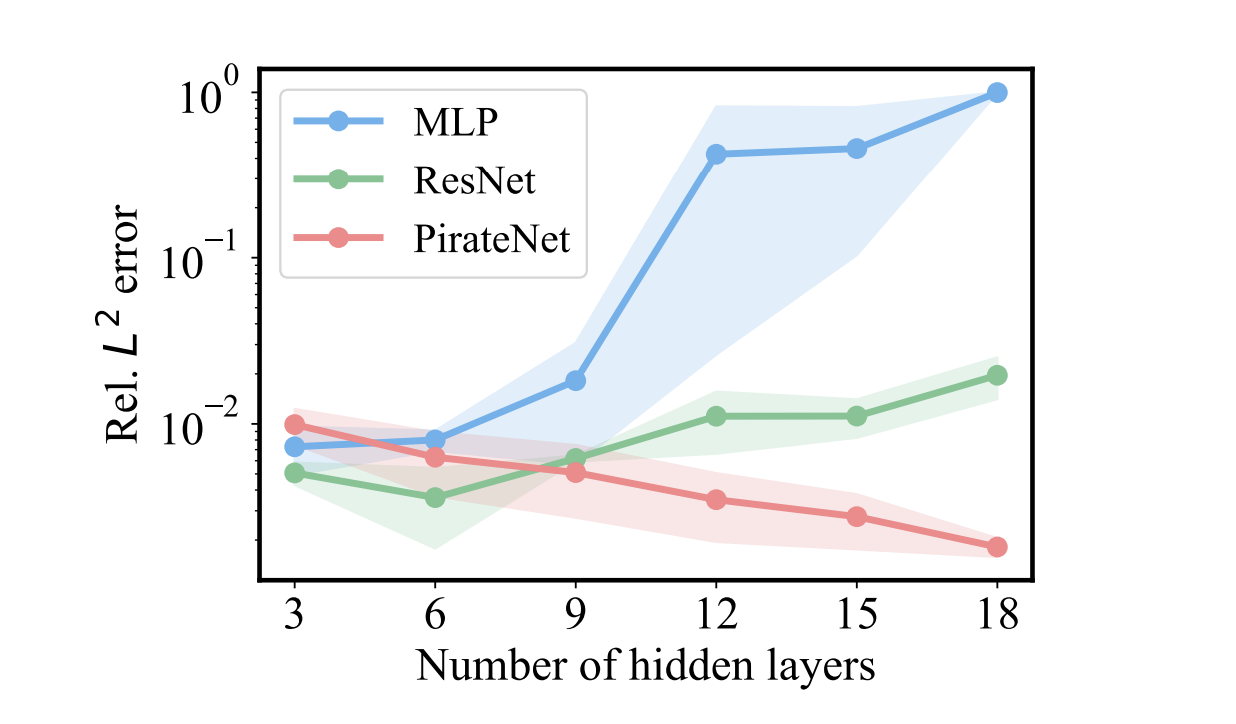This AI Paper Introduces PirateNets: A Novel AI System Designed to Facilitate Stable and Efficient Training of Deep Physics-Informed Neural Network Models

With the world of computational science continually evolving, physics-informed neural networks (PINNs) stand out as a groundbreaking approach for tackling forward and inverse problems governed by partial differential equations (PDEs). These models incorporate physical laws into the learning process, promising a significant leap in predictive accuracy and robustness.
But as PINNs grow in depth and complexity, their performance paradoxically declines. This counterintuitive phenomenon stems from the intricacies of multi-layer perceptron (MLP) architectures and their initialization schemes, often leading to poor trainability and unstable results.
Current physics-informed machine learning methodologies include refining neural network architecture, enhancing training algorithms, and employing specialized initialization techniques. Despite these efforts, the search for an optimal solution remains ongoing. Efforts such as embedding symmetries and invariances into models and formulating tailored loss functions have been pivotal.
A team of researchers from the University of Pennsylvania, Duke University, and North Carolina State University have introduced Physics-Informed Residual Adaptive Networks (PirateNets), an architecture designed to harness the full potential of deep PINNs. By submitting adaptive residual connections, PirateNets offers a dynamic framework that allows the model to start as a shallow network and progressively deepen during training. This innovative approach addresses the initialization challenges and enhances the network’s capacity to learn and generalize from physical laws.
PirateNets integrates random Fourier features as an embedding function to mitigate spectral bias and efficiently approximate high-frequency solutions. This architecture employs dense layers augmented with gating operations across each residual block, where the forward pass involves point-wise activation functions coupled with adaptive residual connections. Key to their design, trainable parameters within the skip connections modulate each block’s nonlinearity, culminating in the network’s final output being a linear amalgamation of initial layer embeddings. At inception, PirateNets resemble a linear blend of basis functions, enabling inductive bias control. This setup facilitates an optimal initial guess for the network, leveraging data from diverse sources to overcome deep network initialization challenges inherent in PINNs.
The effectiveness of PirateNet is validated through rigorous benchmarks, outshining Modified MLP with its sophisticated architecture. Utilizing random Fourier features for coordinate embedding and employing Modified MLP as the backbone, enhanced by random weight factorization (RWF) and Tanh activation, PirateNet adheres to exact periodic boundary conditions. The training uses mini-batch gradient descent with Adam optimizer, incorporating a learning rate schedule of warm-up and exponential decay. PirateNet demonstrates superior performance and faster convergence across benchmarks, achieving record-breaking results for the Allen-Cahn and Korteweg–De Vries equations. Ablation studies further confirm its scalability, robustness, and the effectiveness of its components, solidifying PirateNet’s prowess in effectively addressing complex, nonlinear problems.
In conclusion, the development of PirateNets signifies a remarkable achievement in computational science. PirateNets paves the way for more accurate and robust predictive models by integrating physical principles with deep learning. This research addresses the inherent challenges of PINNs and opens new routes for scientific exploration, promising to revolutionize our approach to solving complex problems governed by PDEs.
Check out the Paper and Github. All credit for this research goes to the researchers of this project. Also, don’t forget to follow us on Twitter and Google News. Join our 36k+ ML SubReddit, 41k+ Facebook Community, Discord Channel, and LinkedIn Group.
If you like our work, you will love our newsletter..
Don’t Forget to join our Telegram Channel
![]()
Nikhil is an intern consultant at Marktechpost. He is pursuing an integrated dual degree in Materials at the Indian Institute of Technology, Kharagpur. Nikhil is an AI/ML enthusiast who is always researching applications in fields like biomaterials and biomedical science. With a strong background in Material Science, he is exploring new advancements and creating opportunities to contribute.



